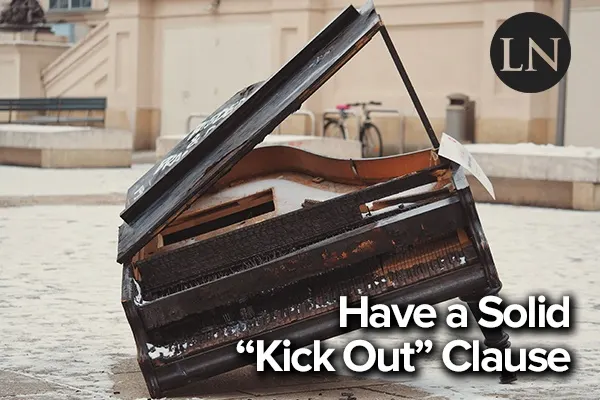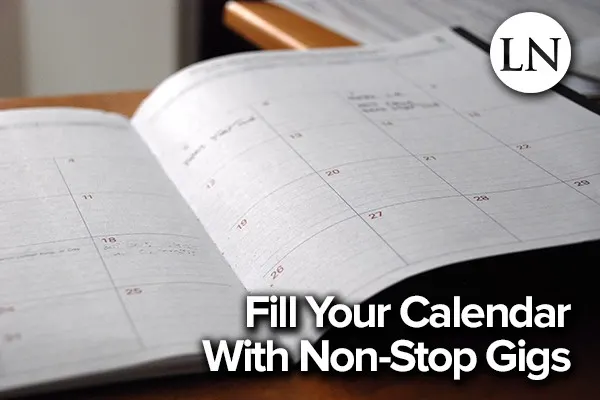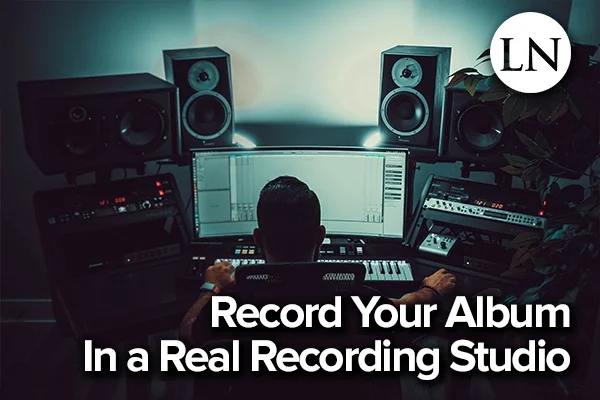
It’s time and you’re committed. After kicking the idea around for too long, you’re finally ready to start your own band. Now what?
You know you want to treat this like a real business and not a bunch of buddies hanging out casually. You don’t want to join a band. You don’t want to form a cover band and build someone else’s brand for them. You want to make it all the way to the lime light on your own merits.
Then you snap back down to the real-deal reality of not even having interested bandmates yet. Don’t worry, I’m going to walk you through the entire process from day one to performing at Madison Square Garden.
How to Start a Band in 9 Steps
Each one of these steps is critical to your success. There’s little wiggle room here to make mistakes. That doesn’t mean you can’t fix any issues, but a lot of bands don’t survive the mistakes. We want to get it right upfront and learn from others’ mistakes.
1) Gather Your Bandmates
You can’t make a band without band members. There’s a lot of ways you can get derailed immediately if you choose the wrong people to join you on your mission. First and foremost, they need to be as serious as you are about it.
There are two types of band members that are serious: 1) The passionate musician that loves the type of music you’re going to be playing, and 2) the hired professional that takes it serious because it’s his job to do so. Disregarding any other details, every bandmate must fit one of these two criteria.
No Casual Musicians: The kind of people you don’t want in your band are casual musicians that aren’t dedicated to improving their craft. They don’t practice their instrument, they don’t know any music theory (and scoff at it), and they show up late to every rehearsal. That right there probably cuts out most of your friends already.
Only One Ego Allowed: We all know the vocalist will be the face of the band. The singer is the only person allowed to have a giant ego. They need it to perform well, to do public relations like interviews well, and to look like a star on stage and in your music videos. If anyone else has a crazy ego, then you’re better off cutting them from the list at the start. It will eventually cause problems.
No Drugs & Alcohol: Of course there’s been exceptions, but if you want to drastically improve your chances, everyone needs to treat this like a career. If they’re already getting wasted at band practice, take a guess what they’ll do on tour. The last thing you need is a bad performance or to lose a member to jail in the middle of your breakout tour.
Set Up Auditions: So how do you start a band with no friends? As a new band, you advertise locally (posters, online, newspapers, networking) that you’re looking for people that can play specific instruments and you hold auditions. David Draiman, the vocalist of Disturbed, joined their band after auditions. It works.
The audition winners need to pass the tests above as well as a few other considerations. Musical skill is important, but being a professional is way better. Ringo Starr, the drummer of The Beatles, isn’t that great. But he can hold a tempo, shows up when needed, and doesn’t mess around when it’s time to be serious.
You want to find someone that’s at least average (you can get better) at their instrument. More importantly they need to be mature, responsible, punctual, and get along with other people.
You can’t have a ton of confrontational people around, though this will always become an issue as you become more like siblings. I’ll give you tips on handling this below.
Know Which Instruments You Need: Finally, you need to map out what your band will sound like. You need an orchestration that fleshes out the frequency band of human hearing. This typically means a vocalist, a drummer, a bassist (or a synth player that wants to play bass lines), a lead guitarist or or lead pianist, and then a rhythm guitar or keyboard player.

Don’t double up on keyboards but you can double up on guitar if you want. You can forgo a rhythm player if you want. The legendary band Rush is a trio, so you definitely don’t have to have 5 or more members if you don’t want. You’ll get a larger share of revenue that way too!
2) Find Practice Space
Some time and effort has passed and you now have a full band. The first thing your new team needs to do is either find a place to practice or start renting rehearsal space. It doesn’t really matter where, but you need a private area that you can focus in without distractions.
This might be your parent’s basement or garage, a music venue after closing, or even a storage unit in the middle of nowhere. A great place to start asking is a church. They may have an unused community center building that’s empty throughout the week. Go ask in person, it’ll help your chances of them saying yes.
There’s not much more to say here. It’s a grind to find a place and if it’s not a space you control then you’ll have to lug your gear around, set it up, and break it down over and over. That’s part of paying your dues. Just make sure you have permission and don’t break noise ordinances.
3) Discover Your Sound
Now that you have a place to rehearse, you simply want to spend some time getting to know one another, personally and musically. Play some covers from your favorite bands. Jam until you start to get in sync as a team and learn how each other communicates.
Get Everyone’s Input: Start to feel each other out. If you pay attention, you can create something unique instead of another “sound alike” band that’s dead on arrival. Take everyone’s ideas into consideration so everyone is fully invested and feels heard.
Make it Work for the Singer: Most importantly is making sure the style that you’re slowly forming fits with the singer. They need to be able to emote the correct feelings for the genre. Singers can’t really change their style like an instrumentalist can, so you need to get this part right.
Survey the band. Ask everyone who their favorite musicians are, what their favorite genres are, what they imagine for the band in terms of sound and look. Ask them what movies convey their feelings the best and maybe even watch those together.
Jam Non-Stop Until You Get It: Most importantly, just jam. Do this as much as time allows. Enjoy it at first and improve your rapport with one another. Then start to pay attention to everyone’s stylistic choices. Your band’s sound will start to become obvious over time.
4) Come Up With a Band Name
This isn’t necessarily the 4th step. It can happen during the 3rd through 7th steps, but you really need to nail it down in that time period. There’s no best way to do this. It tends to end up being some whacky reference or inside joke between you all that gets chosen.
We wrote about how 13 famous band names were chosen that should help start your juices flowing. One thing to do is just spit out whatever comes to mind and write them all down. This could take weeks, but catalog all of the names. Later you can review them and narrow down the ones you like.
You may not choose one of them, but it’ll show you the direction you should be thinking. Everything you see in your daily life can be inspiration. You’ll be sitting at your desk thinking “The Coffee Cups!” It’ll become your life until you decide on a name. It’s a fun phase, so enjoy it. Don’t get frustrated.
Two Big Questions: Two things you need to think about: 1) Is this name available as a trademark?, and 2) Is it unique enough to show up at the top of Google without competition? If you name yourself something like “The Cars” or “The Police,” you’re going to have a bad day. It works for them because they’re huge and established. It won’t work for you.
An example of that is LedgerNote (the website you’re on). It’s as unique as possible and relevant without being absurd, but feel free to get absurd. Limp Bizkit is absurd but works. You can also mess up spellings on purpose, like Korn.
This can be a pretty intimate time period and nobody can tell your group how to name themselves. Try whatever it takes to come up with a name, and start narrowing down the feeling you want until you land on something.
Let Time Pass With Your New Name: The last word of wisdom is that any name will start to sound good and make sense once it has some history behind it. Again, Limp Bizkit and The Beatles are some of the worst names ever. But they make sense now, and yours will too.
5) Writing Your Material
This is where you’ll start to figure out who is who, who has which strengths and weaknesses, who is happy to let go of some control and who isn’t, etc.
Principal Songwriters: You’ll likely end up having a principal songwriter or two, and that’s fine. Someone’s creative output will exceed the others and their ideas will be better. But everyone should be allowed to contribute song sections, melodies, harmonies, and rhythms, even if other members help fix them up.
Include Everyone That Wants to be Included: It needs to feel like a group effort and everyone must feel included, or you’ll end up with arguments when it comes time to hand out songwriting credits (which effects income). Spread the love as much as possible. It’s better to share credit now than to have the band break up later over being stingy and lose it all.
Be Able to Read & Write Music: If you’re all serious and you chose your bandmates correctly, everyone should know their instruments and what roles they play in a song. They should be able to write musical notation on actual musical staff paper. You can use notation paper or even software, but your ideas need to be put down in that format. Otherwise, record demos to listen back.

Know How to Write a Song: You need to know about choosing a musical key based on their emotional characteristics, writing chord progressions, dealing with song structure and song arrangement, and more. Hopefully you all already know about it (or at least one member does) or you’re going to have a period of studying to do.
Write at Least 15 Songs: Why do I say this? Because you’ll want at least that many for your first album and you’ll need at least that many for your live performances. If you have extra time to fill at a low-level bar gig you can test out new songs you’re writing or play some exciting covers everyone loves. But you need to spend 99% of your time on your own material.
Quality Over Quantity: Take your time here. Quality is always better than quantity. Linkin Park took years upon years to write their first album and it was a 12 track masterpiece. Each song was capable of being a single. That’s what you want on your breakout record. After that a big label will rush you to pump out an album a year. Get the first one right.
Copyright Each Song: Yes, it’s a pain in the butt, but do it. Do you know how many bands have sent out demos to record labels only to hear their songs end up on some big release by a huge band? If you don’t copyright your song, you’ll have little legal recourse to go on the offense or defense when needed.
6) Create a Contract
You can go as far as to make this a legally binding contract or just a casual band agreement, but it needs to be put on paper and everyone needs to sign it and have a copy. The main reason bands break up is in-fighting, and this is how you stop it.
Here are some things to consider having in this agreement:
- Rehearsal expectations
- Assigning responsibilities
- Illicit substance avoidance
- Professionality in general
- Touring & gigging availability
- Contributing financially
- A “Kick Out” clause
We can’t go over this entire topic here, but you can fill in the details and gaps.
Have a Bookkeeper: Everyone needs to know what their roles are, for one. Like one person might do all of the finances, legal paperwork, and taxes for an extra 5% of the revenue. That’s called a bookkeeper.
You also need to agree on how financial losses are handled. The best way is to have a “float” or reserve of money that belongs to the business. That way if you don’t make enough money, get ripped off, have an instrument stolen, it can get paid for without people having to pony up cash, which will cause resentment.
Have a Rehearsal Director: This person controls practice time. They keep everyone on track, calls out songs, pays attention to each member and compliments, corrects, and chastises them. They call missing members, send out group text reminders, and anything else needed. They bring snacks to practice. They’re the first to arrive and last to leave.
If someone decides they don’t want to contribute to songwriting, then that can be on paper when they cry about songwriting credits. It doesn’t matter the detail, but it needs to be in this agreement. It can grow and be added to over time when new issues arise, but always talk it out and get it into the agreement.
Everyone needs to pay for their gear, and repairs and maintenance can come out of gig money as well as marketing materials. Everyone needs to contribute equally to the cost of going into the studio to record your album.
Have a Public Relations Manager: Though every bandmate should perform at least one act of promotion every day, someone should be the marketer and public relations manager. That person will call venues and get gigs. They’ll get you interviews with websites, magazines, and newspapers. They’ll make music videos happen.
Most Importantly, Have a “Kick Out” Clause: You need to have a clause that allows you to kick a member out of the band. This is extremely important and getting them to sign it and get it witnessed by a lawyer will be a huge benefit later on. The band Yes has broken up and gotten back together so many times, split into two and fought over the usage of the band name, etc. Iron all of this out up front.

You need to work all of your expectations into this clause. Maybe you can have a number of strikes in place and each incident can have different weighting. You can be creative, but you need a way to get rid of a poisonous band member if needed. Don’t skip this.
You Must Have a Bandleader: Further in the article I talk about a very important decision to make… someone needs to be the bandleader and that’s probably you, the guy that formed the band. You need to make sure everyone agrees on this and respects it.
You’ll have the veto vote and the tie breaker vote and control the general direction of things. Think of it as the CEO. You may even sign the checks. Every company needs a hierarchy and your band is a business and the band members are the company.
7) Mold Your Stage Presence
Before you step on stage as a group, you need to practice your very own material together as much as you can stomach until you know it by heart. Then mix up the order of songs and make sure you really know it.
Get Your Performance Together: Practice soloing. Practice silly things like the entire band doing the same synchronized dance in certain parts of certain songs. Let the vocalist practice talking to a fake crowd and getting them excited. Practice working all sides of a fake stage. Just get comfortable and get good.
Get Your Look Together: This is also when you can start deciding if you want to have “costumes” for lack of a better word. I don’t mean that you’ll all wear face paint or dress up in silly outfits, though you can. What I mean is that you need to start compiling outfits and looks that make you larger than life. And everyone needs to get on the same page, fashion-wise.
Wearing long hair and a bandana with torn up jeans and dirty tennis shoes isn’t going to cut it. Commit to looking huge, acting huge, talking huge. People don’t want to listen to you while you perform, they want to be you, and you need to play into that. Even if it means hiring a fashion designer. Stage presence is everything.
Be Larger Than Life: You don’t have to spend the money on it now but eventually you may consider buying your own lights and fog machines and things of that nature too, so even in smaller venues like a bar or restaurant you can really spice up the gig. Always focus on being larger than life.
8) Start Gigging & Never Stop
Your band is finally ready. Every detail is together, the operation is agreed upon and well oiled. Now it’s time to start making things happen out in the real world. The nice thing is, if you gig enough you can stop rehearsing altogether.
Create an Electronic Press Kit: This is a must. It’s basically your band’s resume. You need to host a website (don’t cheap out on a free one domain, get a real website together at “Your Bandname Dot Com”). You’ll want to include items like:
- Your logo & band photos (professional photoshoots and live gigs)
- Band biography (who you are, what kind of music you play, what your message is)
- Embedded music player with 3 songs
- Embedded music videos or live performance footage
- List of accolades, positive quotes, notable performances (opened for Nickelback!)
- Contact information (email address, phone number, mailing address)
This is what your public relations manager will share with venue owners and promoters to help them accept you and then promote your show. A social media profile does not cut it. You have to have a professional website. This can cost less than $5 a month these days. Get it done.
Get the Gigs on Your Calendar: Your public relations manager needs to be on the phone nonstop filling up your calendar with gigs. You should be calling every bar downtown and asking them for their time slots. Book a gig months in advance, who cares. Just fill up your calendar. Use a cloud-based online calendar where every member can constantly check it at home or on their phones.

Give it Your All Every Time: Each time you step out on stage, you should remember that there is probably some connected person in the audience. They might even straight up be an A&R, or at least know one. Every audience member deserves your best, even if they aren’t paying attention. Each fan can become a “brand disciple” and put you on social media, spreading your name.
Never Gig For Free: Please, never accept the lie that you’re getting paid with the opportunity. Never play for free. This is your job and you’d never disrespect someone else by asking them to work for free. Never do it. Ever. Every job pays or it’s not a job, it’s you getting taken advantage of.
Sell Merchandise: At the least you need to have business cards ready to be taken. At best you can have free demos to hand out with your website and contact info. Even better, you can have a short run of stickers and T-shirts ready to be sold. At best, you’ll have a professionally pressed CD ready to sell or even branded USB sticks with your album in mp3 format. See below for more about your first record or demo.
Avoid Living in a Van: Don’t start taking gigs in surrounding states that lead to you spending all the money you make on gas and van repairs. If you end up spending all of your time driving around, your bandmates are going to quit after they go absolutely insane trying to stick it out. Stick to local gigs and only travel when you can play festivals or some higher stakes gig like opening for a big act.
This is all about two things now: 1) Growing your brand, and 2) Making money. You can’t do this forever without turning a buck, so make sure you’re getting paid on time and enough. Don’t accept low-ball offers just to stay busy.
And be meticulous with your record keeping and pay your bandmates on time, every time. All finances should be transparent too. If they want to look at the spreadsheet, invite them over to look. Openness and trust will be everything as the stakes become larger.
9) Start Marketing & Never Stop
Gigging isn’t enough. If you simply do gigs, you’ll never grow. You’ll find a solid 15 spots that let you play and you’ll just play them over and over. You need to be actively marketing your band and music so you attract new fans that in turn start doing promotion for you. Even then you never stop promoting.
Always Seek Growth: Let me tell you this. On the day a band stops promoting, that’s the day they start to die off and eventually disband. If you aren’t experiencing growth, you’ll lose momentum and excitement, and your bandmates will stop being committed. They’ll form new bands or join other ones, or quit to get a day job.
Measure Your Growth: You should create key performance indicators, which are measurable metrics that are easy to understand and graph on a chart. Watching these metrics go up or down will let you know which marketing activities are worth your time. The charts are a great way to keep everyone excited too.
For instance, you can track items like:
- Gross Income Per Month
- Spotify & YouTube Streams Per Month
- Album & Merchandise Sales Per Month
- Number of Gigs Played Per Month
You can create any metrics you want. But you should track them and have monthly reviews of it at the first rehearsal of the month. Keep everyone excited and committed to increasing those numbers. It’s like a video game if you want it to be, and you can work in rewards for the band when you achieve certain milestones.
Recording Your First Demo or Album
You’ll notice I skipped over recording your first album or demo, and there’s a reason for that. You don’t have to get one recorded in the stages above, but also I wanted to separate it to call out its importance.
Don’t Record & Mix It Yourself: It’s very likely that one of you has some equipment and the skill to record on a computer. The problem is you don’t have an acoustically treated place to record. You probably aren’t a good enough mixing engineer either. And it’ll take you forever and you’ll fall into perfectionism if you do it yourself. Just avoid this. The temptation of learning how to start producing music will be a huge distraction you don’t need.
Go to a Recording Studio: There are good reasons to spend the cash to go to a studio. First and foremost, you’ll be forced to practice and be ready. Then there will be a deadline in the studio to get all the tracks down. Then you’ll get the chance to punch in, add solos, layer vocals, whatever. This process will keep you disciplined and organized.

It’s also good to understand how recording in a studio works. And at the end of the day you’ll get better and faster results with good mixes and mastering taken care of. You don’t want to cheap out and end up with a lower quality final result. This demo or album is what everyone will hear. Put your best foot forward.
Sell Your Album Cheap at Gigs: Don’t worry about making much money here. You just want to cover costs and make a little extra. A short run of 100 CDs can be had for about $300, or even less with USB sticks. If you sold them at $5 each, you could come away with $200 profit, but most importantly you want to create fans first.
The pay from the venue is where the bulk of your profit will come from. It’s always been that way, even for huge bands. Merchandising is the icing on the cake, but not the main course by any stretch. Don’t get greedy here, yet anyways. Later on you can sell $30 T-shirts and hats.
Send Your Album to Labels: Yes, a ton of these will end up in the circular file (garbage can). But what happens is some A&R looks or listens to your album and remembers your name. Then when they randomly catch you out at some bar gig, they go “Hey, I know these guys” and pay a little extra attention.
Even better, you start meeting people that know the A&R you’re targeting and can keep passing his friends and associates your album. The more times these albums end up in his hands, the better. You’ll show initiative, organic growth, and hustle. That’s what they want more than anything. They want you to do all the hard work while they make all the money. That’s who they want to sign.
Get it Stocked Locally: You don’t have a distribution deal, so landing in Best Buy or Walmart is a no-go, but you can get your album in local consignment shops, smoke shops, and any where else you can make a deal with. Sales aren’t the goal here, just “brand impressions.” You want people to see your name and then go home and pull it up on Spotify.
Get Online Distribution: Your main promotional vehicle will be the internet. It’s cheap for you and breaks you out of the local space. You need online music distribution that lands you on iTunes, Spotify, CD Baby, and every other streaming site. Of course you can grind this out yourself, but paying to have it done is more efficient, and they can give you reports and distribute royalties to you.
What I’d recommend is to start thinking of every album release as the start of a new chapter for your band. That chapter should include a supporting series of gigs or a tour, a set of merchandise, a key number of sales of the album and a number of music streams online.
You need a goal to meet before you start launching the next chapter, where you’ll raise the bar and make sure you go harder each time. Force growth no matter what it takes. And remember. Never stop gigging and definitely never stop marketing. Don’t wait for some label to scoop you up. It won’t happen unless you conduct your business like it never will.
Remember, labels don’t sign bands. They sign businesses. It’s more like a business acquisition. They don’t want to nurture you, make you sound mature, promote you, get you gigs, etc. They want to see that you’re already doing that successfully. That cues them in on the fact that the two of you can make money together, rather than you being a bunch of deadbeats that happen to “play good.”
Make Your Own Band a Success By…
When starting a band, everything will seem to be trending upwards if you and your bandmates are taking it seriously. It’s once you start to find success that musicians tend to relax, rest on their laurels, and even start making common mistakes.
Here’s a list of things you need to be concerned with if you want to continue growing your fan base and not see it all come crashing down. You know how to start a band now, and keeping it together and growing is the next challenge:
Common Goals & Responsibilities: I mentioned this above but it’s massively important. You all need to have skin in the game. That can include passion, time, energy, and money. Everyone has to be committed to the full success of the band and business. Also, everyone has been assigned and agreed to critical responsibilities. Don’t let anyone slack (remember the Kick Out Clause).
Personal Relationships: This is a tough business. If a band member can’t set boundaries for their spouses, children, girlfriends or boyfriends, buddies, or anyone else, then they’ll be constantly pulled away from the band. They’ll be given ultimatums about quitting the band.
This needs to be talked about and priorities agreed upon or they need to leave the band. It gets worse with touring. Also, no kids, spouses, or girlfriends / boyfriends should be allowed at rehearsals or at the studio when recording. They can come to gigs but they need to be a part of the crowd until the full show is over. They don’t need to bother you during set break, for instance.
Group Dynamic: Does everyone in the band get along? Are there already grudges being held and beefs being started? Don’t let this poison occur. If someone has to get fired to make it stop, then fine. But in-fighting will destroy your band.
No Drugs or Alcohol: When you’re rehearsing, gigging, or anything else related to the band, then these recreational substances need to be out of the picture. You can’t use them at a real job, and this is a real job, right? These will kill your mood, motivation, reliability, punctuality, performances, and band.
Constant Musical Growth: All band members need to be similarly skilled at least. They need to all meet some threshold of skill or they’ll be the weak link. And everyone should be practicing constantly, learning new methods, more music theory, better songwriting, etc.
Financial Literacy & Reward: Everyone needs to be making money in the band, eventually. Part of making that work is they have to be good with money (not wasting it). The more they struggle with money, the more hours they’ll work at other jobs and they’ll start prioritizing it over the band. Bands break up over members stealing from the coffers too. Don’t have financial dunces in your band.

Beyond this, everyone needs to care about your music. If you have one person suddenly decide your rock band should become a pop country band, then you’re going to have in-fighting. Make sure it’s always about the genre, not just your own music. All members need to live and breathe your genre.
Tips For Career Growth & Income Management
As time passes, you’ll start to wear down. It’s hard for your band to “wear all the hats.” You don’t have to wait to sign to an independent label or major label to start offloading some of these tasks to professionals.
Form an LLC / Get Trademarks: You’ll eventually want to form a legal business that can pay taxes and receive legal forms, give you financial protections, etc. You’ll also want the trademark on your band name, which won’t cost but a few hundred bucks. Protect yourself legally!
Hire a Manager / Booking Agent: Eventually you can hire a manager that doubles as a booking agent. They can take over the tasks of the public relations manager. They’ll get you gigs and interviews, eventually radio and TV appearances, merchandise distribution deals, etc. The better they do for you, the more money they make, so they’re motivated and it’s worth your time and money to make happen.
Hire an Accountant: Next, offload the bookkeeping to a professional. Send them proof of every payment you accept, receipts on expenses (food, gas, clothing, gear, instruments, repairs), and anything else related to your income and expenses. They’ll keep it together, can issue payments to your bandmates, and file your taxes when it’s time. Not having to worry about will remove a huge burden from your band.
Hire a Marketing Agency: You can get professionals to promote your website so it ranks better in search engines. They can promote your songs and music videos online. They’ll do a marketing blitz for your new album with all of their industry connections. You’ll get blog posts, press releases, interviews, and more. All of that can be leveraged later to land you better gigs and end up getting signed.
The main thing here is to get back to being creative. You and your bandmates probably just want to write music and perform it. And musicians usually suck at everything business related anyways, so the sooner you hand it off to the pro’s the better.
Conclusion – Forming a Band is Easy…
Knowing how to form a band is no big deal, but sticking together is hard. Even The Beatles couldn’t pull it off. With all of the information above, you should have no problem getting serious musicians together in the pursuit of a real business. That’s how you have to treat it.
Now that you know how to start a band, you need to execute the steps. You’ll be tempted to be lax on parts, but don’t stray from the outline. Your success depends on it. This is basically down to a science these days. Don’t relearn mistakes that we all already know about. Go forth and have fun and keep it professional!